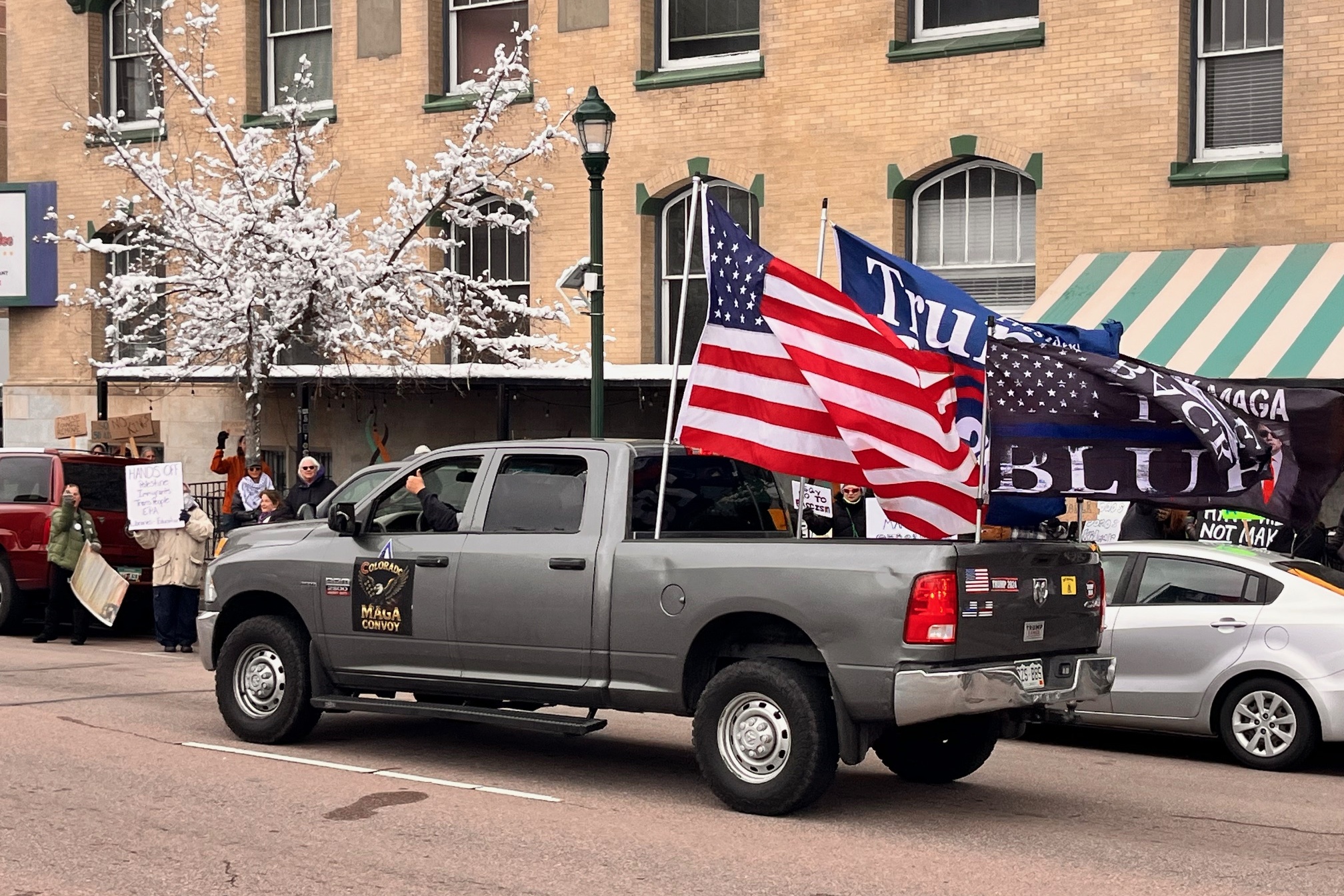
Former Gov. John Hickenlooper, who came through a Democratic senate primary full of missteps and controversy, said the size of his victory proves he didn’t suffer permanent political damage.
“When you win an election by 20 points it’s hard to say you are wounded,” he said.
Hickenlooper beat former state House Speaker Andrew Romanoff in Tuesday’s primary. He’ll face incumbent Republican Sen. Cory Gardner in November.
The controversies that dogged Hickenlooper’s primary campaign included a finding by the Colorado Independent Ethics Commission that he violated the state’s gift ban twice while he was governor and a contempt citation from the commission for ignoring a subpoena to attend a hearing.
Critics also hit Hickenlooper for statements and actions they said were racially insensitive. Romanoff and national Republican groups spent millions on ads in the last weeks of the campaign attempting to capitalize on those mistakes.
“I think the election demonstrated that people know who I am and if at times I misspeak or, you know, say the wrong thing — I’m not saying that’s a good thing — what I’m saying is that people know that I have worked with this state... I am a known quantity,” Hickenlooper said.
The primary over, Hickenlooper and Gardner are already sparring over health care. In a Colorado Matters interview Wednesday, Gardner accused Hickenlooper of backing “socialized” medicine.
In a separate interview, Hickenlooper said he wants to build on the Affordable Care Act with a public option that would ultimately lead to universal care. He called Gardner’s health care record, which includes votes to repeal the Affordable Care Act, “abysmal.”
Another issue that’s likely to surface during the campaign is whether Democrats will attempt to dismantle President Donald Trump’s tax cuts. Asked whether he’d support restoring the taxes, Hickenlooper said the cuts largely benefitted the wealthy and that small business didn’t get enough COVID-19 relief funds.
Pressed on whether he’d undo the cuts, Hickenlooper responded: “I’m not going to say that we’ll automatically get rid of everything but a large part of those tax cuts went to, you know, large corporations, the wealthiest individuals who really didn’t need them. And I think certainly that those parts of the tax cuts should certainly be repealed.”
Interview Highlights
On his health care plan:
“I believe we build on the foundations of the Affordable Care Act, not perfect, but I think we can improve it. I think we need to get to universal coverage and probably the fastest, most effective way to do that is by creating a public option of some sort, a sliding-scale public option. But what we really gotta focus on is controlling the cost of healthcare … you know, there's a runaway inflation in prescription drugs and insurance premiums and copays. I mean, that's where, once we get universal coverage, that should be our highest priority.”
On the lack of COVID-19 relief for small businesses:
“Look at how COVID-19 has hit the United States compared to what’s happening in the rest of the world and look at the consequences to our economy. And the relief that has been provided .. it’s notorious that it has not gone to the smallest businesses. It has largely gone to large companies, businesses that had other resources. I mean over a hundred publicly traded companies received part of that first CARES Act.”
On how he’ll heal divisions among Democrats after the primary:
“I’m going to reach out to every supporter of Andrew Romanoff and make the case that I’ve supported universal health care, that health care is a right, not a privilege. I believe that climate change is a grave existential threat to the planet … I need to go out and talk to those supporters of Andrew Romanoff and really listen to them and hear them and hopefully persuade them that we agree on far more than what we disagree on.”
Read The Transcript:
Ryan Warner: Governor, welcome back to the program.
John Hickenlooper: Always a pleasure to be back on.
RW: Senator Gardner and the GOP were running ads against you before the primary highlighting how you've previously said you didn't think you'd make a good Senator, picking up on your ethics violations, being held in contempt by the ethics commission. Do you enter the general election as a wounded candidate?
JH: No. No. When you win an election by 20 points, it's hard to say that you're wounded, but let me, let me be clear. The Republicans and the dark money, Republican groups from Washington, and Senator Gardner has been a vocal in support of these efforts, they've only just begun. They're going to keep attacking me. They're going to twist and distort my record. They're going to attack, you know, my reputation every way they can, because you know, Senator Gardner really can't run on his record. I mean, he supported Donald Trump a hundred percent of the time. He has frequently reiterated the fact that he supports the lawsuit to get rid of the Affordable Care Act. He doesn't think universal background checks really work. I mean, I can go down the whole list, but we expect the attacks just to continue. And you know Coloradans showed last night that they're not going to buy into this defamation and, and, and assassination of character.
RW: Among the successes that Senator Gardner is likely to point to in the general election, helping get the Great American Outdoors Act passed, helping bring the Bureau of Land Management headquarters to Grand Junction; Space Command to Colorado Springs; equipment to fight COVID-19 for which he was praised by Governor Polis. It's not that he has nothing to run on. I think as you suggested earlier, what's your message to say he's not right for Colorado right now.
JH: Well, I think that the, his record on healthcare is abysmal. I mean, he supports the lawsuit that would end the affordable care act for all intents and purposes.
RW: He actually wouldn't be pinned down on the question of the Trump Administration's brief with the Supreme Court to dismantle the ACA.
JH: Well, he said before he does, so maybe he's changed and hasn't figured out how to, how to talk about it yet. But I mean, we have 2.4 million Coloradans that have preexisting medical conditions and they have protections as part of the Affordable Care Act. If Senator Gardner wants to maintain those protections and doesn't support that lawsuit, was he willing to say that to you?
RW: He was not.
JH: Again, I think if you want to run on your record, lay out what things you do support. Did you discuss the CORE Act with him, which is, you know, and again, I'm a, the Land and Water Conservation Fund is important. And I support that bill, but the CORE Act is 400,000 acres of Colorado land, some of which, you know, at least I've been led to that, that Senator Gardner thinks should be sold or leased off to the highest bidder. Again, I'm not sure that's where most Coloradans are in terms of public lands.
RW: In my conversation with Senator Gardner, he characterized your position on healthcare as socialized medicine. Does that label fit your health policy?
JH: Well, you know, it's funny, I just came through a primary, where I was attacked for not supporting, you know, larger government involvement in healthcare. I've been, I think, very consistent. And I think, you know, this that I believe we build on the foundations of the Affordable Care Act, not perfect, but I think we can improve it. I think we need to get to universal coverage and probably the fastest, most effective way to do that is by creating a public option of some sort, a sliding scale public option. But what we really gotta focus on is controlling the cost of healthcare is that, you know, there's a runaway inflation in prescription drugs and insurance premiums and copays. I mean, that's where, once we get universal coverage, that should be our highest priority.
RW: It was a bumpy primary for you. I mean, the ethics ruling, the ethics commission holding you in contempt, your answer that 'every life matters' when asked about Black Lives Matter. Also video of you emerged likening political life to ancient slavery. You apologized for those things, I'll say. And then just before the primary photos of you emerged in an indigenous headdress and clothed as a native woman, which was apparently penance for losing a hunt. Do we now have a solid pattern of insensitivity, John Hickenlooper?
RW: No, I don't think so. I, again, I think the election demonstrated that people know who I am and if at times I misspeak or, you know, unintentionally say the wrong thing, I'm not saying that's a good thing. What I'm saying is that people know that I have worked with this state. We were 40th in job creation. We became the number one economy in the country. We got to almost 95% healthcare coverage. We reduced the number of people without coverage, by more than two- thirds. But go down that list of accomplishments that we've done. Again, I am a known quantity. I have a relationship with the people of Colorado and, you know, the, these political attacks. I don't think we're going to, going to sell in Colorado.
RW: Our Bente Birkeland spoke with an indigenous woman who was in tears as she described, how that photo of you dressed as a native woman made her feel. Would you care to share just a few words about that?
JH: Sure. And this was a longstanding traditional hunt. The headdress was placed on my head by the hunt chief, Chief Shoyo had I not allowed him to do that he would have been offended. It was a very complicated situation, but you know, that she would feel such anguish about it is certainly not, not good, not, you know it's certainly nothing that I would well, it's nothing that I would ever do again, recognizing that I could would cause her that kind of, of anguish.
RW: I'd like to play something from voter Tyler Higaki, a 27-year-old Air Force veteran who voted for your opponent in the Democratic primary, Andrew Romanoff.
Tyler Higaki: I feel that the establishment Democrats have shoehorned another lesser-of-two-evils scenario. And I get the fact that they're relying on the whole 'Vote Blue, No Matter Who' and frankly, I'm just, I'm sick of the guilt trip.
RW: How do you respond to Romanoff supporters who are bummed out and not sure that you're the guy?
JH: Well, I'm going to reach out. And, you know, Andrew Romanoff, when he called was very gracious and he said he would work with me to unify the party in the effort to make sure that we defeat Cory Gardner in November. I'm going to reach out to every Coloradan, but I'm, I'm going to reach out to every supporter of Andrew Romanoff and make the case that, you know, I've supported universal healthcare. That healthcare is a right, not a privilege my entire life. I believe that climate change is a grave existential threat to the planet, the greatest one we've ever faced and we've got a very detailed plan of how we get to zero emissions by 2050. You know, I need to go out and talk to those supporters of Andrew Romanoff and really listen to them and hear them and hopefully persuade them that we agree on far more than, than what we disagree on.
RW: Okay. We got a little pushback from the left. How about some pushback from the right? You think President Trump has been bad for the country. You think I just want to play this from former GOP State Party Chair, Dick Wadhams.
Dick Wadhams: In terms of the Trump agenda, listen, I don't disagree that Trump is a liability, but I also know this, that when we get to specific issues, in terms of the Trump record, the tax cuts, if Hickenlooper wants to repeal the tax cuts, he is imposing a tax increase, not only on individual taxpayers, up and down the economic ladder, but also on small businesses across this country. That's one of the reasons why this economy exploded.
RW: If elected, would you seek to undo the Trump tax cuts?
JH: Well, I think those tax cuts, I mean, 83% of the benefit of those tax cuts went to the 1% wealthiest Americans. Basically, what they did in the tax code, even before COVID-19, they transferred over the course of 10 years, over one and a half-trillion dollars of debt that our children and grandchildren are going to have to pay. On top of that, after COVID-19 came in and President Trump pooh-poohed it, you know, Senator Gardner didn't say anything, but it's not going to be a big deal. We don't have to worry about it. Look at how COVID-19 has hit the United States compared to what's happened in the rest of the world and look at the consequences to our economy. And the relief that has been provided, I mean, it's notorious that it's, it has not gone to the smallest of small businesses. It has largely gone to large companies, businesses that had other resources. I mean, over a hundred publicly traded companies received part of that, that first CARES Act.
You know, I grew up in small business when I first opened my first restaurant, I'd lie awake at night trying to figure out how to make payroll. This is an experience that I don't think Mitch McConnell ever had. I don't think Cory Gardner's had it. And I don't think Donald Trump's had it. They seem immune, they seem oblivious to the struggles and the hardship that this has created for small business. I want to be part of going back and changing that.
RW: Well, I think that the point Wadhams is making though, is that a reversal of the Trump tax cuts though, you see them as being quite uneven, would affect small businesses. So are you saying that you would or would not undo the Trump tax cuts?
JH: What I'm saying is that I am going to go to bat for small businesses in the U.S. Senate.
RW: Yes or no, on the tax cuts.
JH: Well, I, again, I'm not going to say that we'll automatically get rid of everything, but a large part of, of those tax cuts went to, you know, large corporations the wealthiest individuals who really didn't need them. And I think certainly that those parts of the, of the tax cuts should certainly be repealed. So many of those people not only didn't ask them, but were to some level or another, you know, were uncomfortable with those tax cuts at that time and how clearly they favored only the wealthiest and largest corporations.
RW: To what extent do you see a victory in Colorado as related to switching Trump voters to vote for you?
JH: You know, I think that that's not the approach, and we're not going to make this just about Trump. This is a campaign against Cory Gardner a, it's a comparison of what Senator Gardner and I stand for and who will speak up to power, you know, when it begins to distort and challenge our democracy, when the very values of this country is based upon, you know, the common decency of, of the American people when that begins to get compromised.
And we're not just talking about the, you know, the lawsuit against the Affordable Care Act. I mean, what's going on in Russia right now where they're providing a bounty for the killing of American soldiers. I just don't even know what to say. And again I haven't seen Senator Gardner really call the president out on this saying, ‘hey, you cannot continue dealing with Russia as if nothing's happened.’ And I know Senator Gardner has a bill that would list Russia, as a terrorist, in alliance with terrorist countries and terrorist activities but I don't think that's enough. My argument is, this is the way Washington has worked for too long where politicians make their decisions based on staying in office. I want to go and change Washington.
RW: Governor, thanks so much for being with us.
JH: You bet, anytime. Thank you, Ryan.









